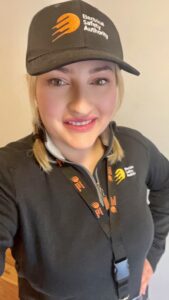Written by Electrical Safety Authority (esasafe.com)
Sonia works for the Electrical Safety Authority (ESA) as an Electrical Inspector. Her inspection territory is the Scarborough area on the east side of Toronto.

About Sonia:
Sonia is a trained electrician with 20+ years of experience in the electrical industry. She began her electrical training as an electrician’s summer helper at the International Brotherhood of Electricians union between the ages of 16 and 18. Sonia’s experience spans many sections of the electrical trade that includes nuclear, local distribution companies (utilities) and commercial and industrial sites.
What do you enjoy most about your work?
I enjoy the diversity of job sites and the ever-changing scope of work and the challenges this provides. As an electrician, I enjoy the fact that the job has taken me to different sites that have ranged from two days to two years. Some of these experiences include obtaining a D-Z license, 0-8T crane operator’s licence, travelling for the Canadian Coast Guard along the east coast testing marine cables on lighthouses that were so remote I had to take helicopters or hovercrafts to them. The latest and most exciting opportunity has been joining ESA and becoming an electrical inspector, which has always been a career goal of mine.
What are some of the challenges you have experienced as a woman in the trades?
Hah, where to start! The most memorable hurdle was dealing with “the one that is not like the rest of them” complex. I have faced challenges being female in a predominately male industry. It is hard to be the “first” female to work somewhere, or the “first” female a fellow electrician had ever worked with. The tough moments that stemmed from the feeling of being singled out helped me develop and grow as a human, teaching me that my opinion of myself is what matters most, and other people’s opinions are none of my business. When people encounter what they’re not used to (female electrician) it’s natural for them to be curious and most of the time their curiosity was just that, not judging, but curious of how I became a tradesperson, and the most common question – “Can she carry a bundle of 1” pipe?” (FYI – the answer is YES). Overcoming stereotypes and being the first woman on various job sites over the years has taught me the importance of self-confidence and resilience.
What are some of the biggest changes you’ve seen since you began your career?
Personal Protective Equipment (PPE) and appropriate workwear was not so readily available twenty years ago, as was the case for too wide steel toe shoes, baggy shirts and overalls with disproportioned inseams. All of which were more common than not. I have witnessed improvements in PPE equipment over the years, reflecting the recognition of the changing demographic of the industry and concerted efforts to be more inclusive.
How have you been supported in your career?
It’s important for me to acknowledge that overcoming the nuances that come with being ‘not like the rest of them’ has been made significantly easier by social groups like Sisters in the Trade, a women’s committee at the IBEW 353. Cheryl Carbis, a fellow ESA Inspector, who was my father’s apprentice a few decades ago, has contributed so much to make a seat at the table for women. To have someone to go to who knows exactly what you are going through was such gift. I have so much respect for the trailblazers that came before me and look forward to contributing to that path for women and diversity in the trades.
What advice would you give to young women considering a career in the electrical trade?
- If it makes you happy, do it! A lot of times our peers or family have strong feelings to dissuade from certain decisions. If working with your hands and seeing how complex systems are built from the ground up, then follow your fire and listen to your opinion of where/what you should be in life.
- Give it a try! Whether it be a co-op placement, a summer help opportunity, or post secondary, try it, jump right in and see if it’s for you. Don’t be intimidated by preconceived notions of a tradesperson, define the term for yourself.
Closing thoughts for aspiring young tradeswomen…
I urge young women to consider the trades as a viable career option, highlighting the benefits of a viable income, healthcare benefits and pensions. I want to stress the importance of a prerequisite education in math and physics. Night courses and online courses are good options.
I encourage young women to reach out to tradespeople they know to understand the workforce and see if it is a good fit. The industry can lead to so many opportunities and many different paths to success.
Electrical Safety Authority (esasafe.com)